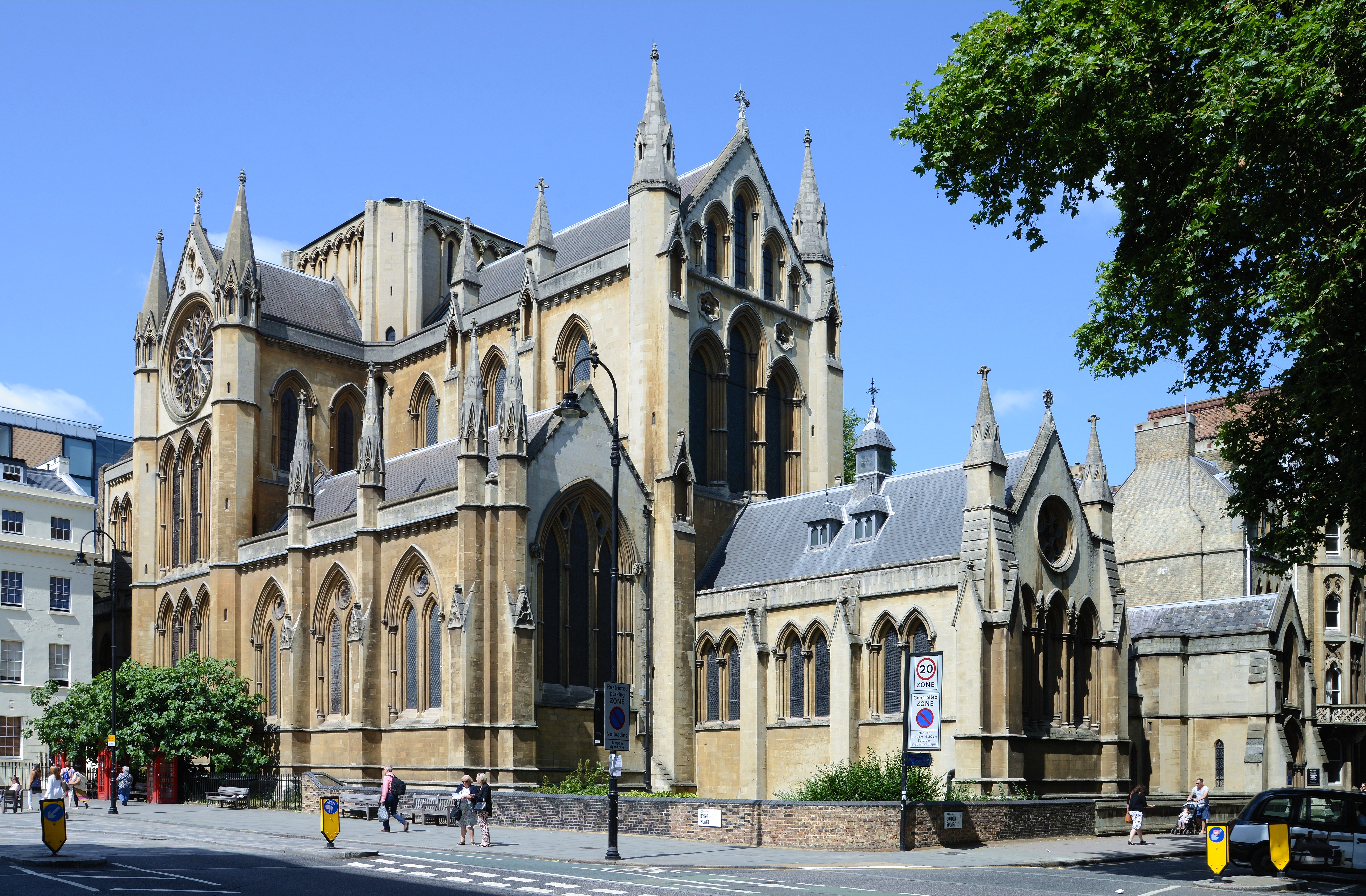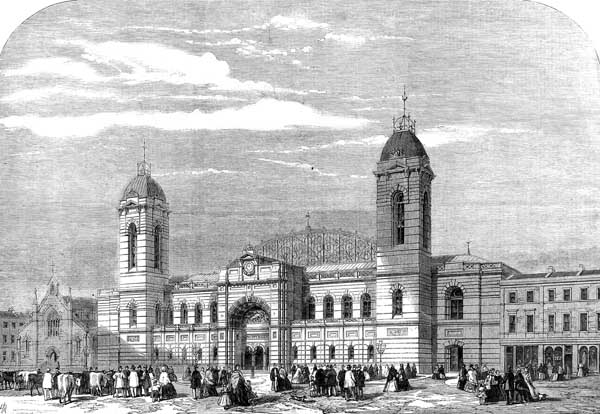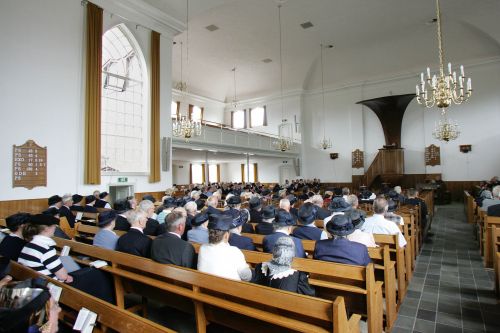|
Irvingite
The Catholic Apostolic Church (CAC), also known as the Irvingian Church or Irvingite Church, is a denomination in the Restorationist branch of Christianity. It originated in Scotland around 1831 and later spread to Germany and the United States. The tradition to which the Catholic Apostolic Church belongs is sometimes referred to as Irvingism or the Irvingian movement after Edward Irving (1792–1834), a clergyman of the Church of Scotland credited with organising the movement. The church was organised in 1835 with the fourfold ministry of "apostles, prophets, evangelists, and pastors". The denominations in the tradition of the Catholic Apostolic Church teach "the restoration to the universal church of prophetic gifts by the direct inspiration of the Holy Ghost." As a result of schism within the Catholic Apostolic Church, other Irvingian Christian denominations emerged, including the Old Apostolic Church, New Apostolic Church, Reformed Old Apostolic Church and United Apo ... [...More Info...] [...Related Items...] OR: [Wikipedia] [Google] [Baidu] |
John Bate Cardale
John Bate Cardale (1802–1877) was an English religious leader, the first apostle of the Catholic Apostolic Church. Life J. B. Cardale was born in London on 7 November 1802, as the eldest of five children to William Cardale (1775-1838) and Mary Ann Bennett. In 1815 he entered Rugby School and in 1818 joined his father's law firm, though he would have preferred to take holy orders. When he qualified as a solicitor on 8 July 1824 his father retired. Cardale's religious beliefs were evangelical and, like other such believers, he was excited by reports of healings and glossolalia taking place in Glasgow in 1830. He visited Scotland in August and, on his return, reported favourably on the phenomena. In October he opened his home for prayer meetings, where similar "outpouring of the Spirit" took place. In April 1831 Cardale's wife, Emma Cate nee Plummer, followed by others, began to prophesy and "sing in the Spirit". However, their Anglican priest rejected the authenticity of the gifts ... [...More Info...] [...Related Items...] OR: [Wikipedia] [Google] [Baidu] |
Edward Irving
Edward Irving (4 August 17927 December 1834) was a Scottish clergyman, generally regarded as the main figure behind the foundation of the Catholic Apostolic Church. Early life Edward Irving was born at Annan, Annandale, the second son of Gavin Irving, a tanner, and his wife, Mary Lowther of Dornock. On his father's side he was descended from a family long known in the district which had ties to French Huguenot refugees. His mother's side, the Lowthers, were farmers or small proprietors in Annandale. He was first educated at a school kept by Peggy Paine, a relation of Thomas Paine, after which he entered the Annan Academy taught by Adam Hope. Scotland Aged thirteen he entered the University of Edinburgh. In 1809 he graduated M.A.; and in 1810, on the recommendation of Sir John Leslie, he was chosen master of the mathematical school, newly established at Haddington, East Lothian. Amongst his pupils there were Jane Welsh, later famous as Mrs. Carlyle, one of the great l ... [...More Info...] [...Related Items...] OR: [Wikipedia] [Google] [Baidu] |
Regent Square (London)
Regent Square is a public square and street in the London Borough of Camden in London, England. It is located near Kings Cross and Bloomsbury. Regent Square was laid out around a large garden in the historic Harrison Estate and first occupied in 1829, forming a garden square similar to more famous ones to the west in Bloomsbury. The southern side of the square is composed of its original buildings, and is Grade II listed in its entirety. Also listed is the phone box within the square gardens themselves. Regent Square was home to the National Scotch Church (the 'Caledonian Church') – the first purpose-built Scottish Gaelic Presbyterian Presbyterianism is a historically Reformed Protestant tradition named for its form of church government by representative assemblies of elders, known as "presbyters". Though other Reformed churches are structurally similar, the word ''Pr ... church in London – which was built between 1824 and 1827. In 1843, it became an English P ... [...More Info...] [...Related Items...] OR: [Wikipedia] [Google] [Baidu] |
Pastors
A pastor (abbreviated to "Ps","Pr", "Pstr.", "Ptr." or "Psa" (both singular), or "Ps" (plural)) is the leader of a Christian congregation who also gives advice and counsel to people from the community or congregation. In Lutheranism, Catholicism, Eastern Orthodoxy, Oriental Orthodoxy and Anglicanism, pastors are always ordained. In Methodism, pastors may be either licensed or ordained. The New Testament typically uses the words "bishops" ( Acts 20:28) and "presbyter" ( 1 Peter 5:1) to indicate the ordained leadership in early Christianity. Likewise, Peter instructs these particular servants to "act like shepherds" as they "oversee" the flock of God ( 1 Peter 5:2). The words "bishop" and "presbyter" were sometimes used in an interchangeable way, such as in Titus 1:5-6. However, there is ongoing dispute between branches of Christianity over whether there are two ordained classes (presbyters and deacons), or three (bishops, priests, and deacons). The first view is affirmed by t ... [...More Info...] [...Related Items...] OR: [Wikipedia] [Google] [Baidu] |
Spiritual Gift
In Christianity, a spiritual gift or charism (plural: charisms or charismata; in Greek singular: χάρισμα ''charisma'', plural: χαρίσματα ''charismata'') is an extraordinary power given by the Holy Spirit."Spiritual gifts". ''A Dictionary of the Bible'' by W. R. F. Browning. Oxford University Press Inc. ''Oxford Reference Online''. Oxford University Press. Accessed 22 June 2011. These are believed by followers to be supernatural graces that individual Christians need to fulfill the mission of the Church."Charismata". ''The Oxford Dictionary of the Christian Church''. Ed F. L. Cross and E. A. Livingstone. Oxford University Press Inc. ''Oxford Reference Online''. Oxford University Press. Accessed 22 June 2011.Wayne Grudem, ''Systematic Theology: An Introduction to Biblical Doctrine'' (Zondervan, 1994): 1016–17. In the narrowest sense, it is a theological term for the extraordinary graces given to individual Christians for the good of others and is distinguished ... [...More Info...] [...Related Items...] OR: [Wikipedia] [Google] [Baidu] |
Names Of God In Christianity
The Bible usually uses the name of God in the singular (e.g. Ex. 20:7 or Ps. 8:1), generally using the terms in a very general sense rather than referring to any special designation of God. However, general references to the name of God may branch to other special forms which express His multifaceted attributes. The Old Testament/Hebrew Bible reveals YHWH (often vocalized with vowels as "Yahweh" or "Jehovah") as the personal name of God, along with certain titles including El Elyon and El Shaddai. Jah or Yah is an abbreviation of Jahweh/Yahweh, and often sees usage by Christians in the interjection " Hallelujah", meaning "Praise Yah", which is used to give God glory. In the New Testament the terms Theos, Kyrios and Patēr (πατήρ i.e. Father in Greek) are additionally used to reference God.''Manual Of Christian Doctrine'' by Louis Berkhof (Aug 1, 2007) pages 19–20 Respect for the name of God is one of the Ten Commandments, which some Christian teachings interpret ... [...More Info...] [...Related Items...] OR: [Wikipedia] [Google] [Baidu] |
Elder (Christianity)
In Christianity, an elder is a person who is valued for wisdom and holds a position of responsibility and authority in a Christian group. In some Christian traditions (e.g., Eastern Orthodoxy, Roman Catholicism, Anglicanism, Methodism) an ''elder'' is an ordained person who serves a local church or churches and who has been ordained to a ministry of word, sacrament and order, filling the preaching and pastoral offices. In other Christian traditions (e.g., Presbyterianism, Churches of Christ, Plymouth Brethren), an elder may be a lay person serving as an administrator in a local congregation, or be ordained and serving in preaching (teaching during church gatherings) or pastoral roles. There is a distinction between ordained elders and lay elders. The two concepts may be conflated in everyday conversation (for example, a lay elder in the Baptist tradition may be referred to as "clergy", especially in America). In non-Christian world cultures the term elder refers to age and exper ... [...More Info...] [...Related Items...] OR: [Wikipedia] [Google] [Baidu] |
Barnsbury
Barnsbury is an area of north London in the London Borough of Islington, within the N1 and N7 postal districts. History The name is a syncopated form of ''Bernersbury'' (1274), being so called after the Berners family: powerful medieval manorial lords who gained ownership of a large part of Islington after the Norman Conquest. The area of Barnsbury was predominantly rural until the early 19th century. By the end of the 18th century, Barnsbury, like other parts of Islington, was regarded as an attractive part-rural suburb by the comparatively wealthy people wanting to move out of the cramped City of London and industrial Clerkenwell. The area is close to the city, and had strong local trade in its position as the first staging post for travellers making the journey from London to the north, and with considerable agricultural traffic and cattle driving to the nearby Smithfield cattle market in the city. Barnard Park, consisting of 10 acres (4 hectares) including a large ... [...More Info...] [...Related Items...] OR: [Wikipedia] [Google] [Baidu] |
Duncan Mackenzie
Duncan Mackenzie (17 May 1861 – 25 August 1934) was a Scottish archaeologist who assisted Arthur Evans in his excavations of the Minoan palace at Knossos. Early biography Duncan MacKenzie was born on 17 May 1861 in the small Gaelic-speaking village of Aultgowrie, just outside Muir of Ord, near to Inverness. He was the fourth of nine children born to Margaret Kennedy MacKenzie and Alexander MacKenzie, who worked as gamekeeper of the Fairburn Estate. The family spoke Gaelic at home, but the children were required to learn English when they went to school. Mackenzie studied philosophy at the University of Edinburgh and received his PhD from Vienna in classical archaeology. Professional career Appointed field supervisor of the excavation of Phylakopi by the British School at Athens, he worked closely with a team of professional archaeologists including Arthur Evans and David George Hogarth. They were investigating the provenance of Mycenaean pottery as defined by Heinri ... [...More Info...] [...Related Items...] OR: [Wikipedia] [Google] [Baidu] |
Islington
Islington ( ) is an inner-city area of north London, England, within the wider London Borough of Islington. It is a mainly residential district of Inner London, extending from Islington's #Islington High Street, High Street to Highbury Fields and Regent's Canal, encompassing the area around the busy High Street, Upper Street, Essex Road, and Southgate Road to the east. History Etymology The manor of Islington was named by the Saxons ''Giseldone'' (1005), then ''Gislandune'' (1062). The name means "Gīsla's hill" from the Old English personal name ''Gīsla'' and ''dun (fortification), dun'' ("hill", "Downland, down"). The name later mutated to ''Isledon'', which remained in use well into the 17th century when the modern form arose. [...More Info...] [...Related Items...] OR: [Wikipedia] [Google] [Baidu] |
Church (congregation)
A church (or local church) is a religious organization or congregation that meets in a particular location, often for Christian worship, worship. Many are formally organized, with constitutions and by-laws, maintain offices, are served by clergy or lay leaders, and, in nations where this is permissible, often seek non-profit corporate status. Local churches often relate with, affiliate with, or consider themselves to be constitutive parts of Christian denomination, denominations, which are also called churches in many traditions. Depending on the tradition, these organizations may connect local churches to larger church traditions, ordination, ordain and defrock clergy, define terms of membership and exercise church discipline, and have organizations for cooperative ministry such as educational institutions and Christian mission, missionary societies. Non-denominational churches are not part of denominations, but may consider themselves part of larger church movements without i ... [...More Info...] [...Related Items...] OR: [Wikipedia] [Google] [Baidu] |
Spiritual Gifts
In Christianity, a spiritual gift or charism (plural: charisms or charismata; in Greek singular: χάρισμα ''charisma'', plural: χαρίσματα ''charismata'') is an extraordinary power given by the Holy Spirit."Spiritual gifts". ''A Dictionary of the Bible'' by W. R. F. Browning. Oxford University Press Inc. ''Oxford Reference Online''. Oxford University Press. Accessed 22 June 2011. These are believed by followers to be supernatural graces that individual Christians need to fulfill the mission of the Church."Charismata". ''The Oxford Dictionary of the Christian Church''. Ed F. L. Cross and E. A. Livingstone. Oxford University Press Inc. ''Oxford Reference Online''. Oxford University Press. Accessed 22 June 2011.Wayne Grudem, ''Systematic Theology: An Introduction to Biblical Doctrine'' (Zondervan, 1994): 1016–17. In the narrowest sense, it is a theological term for the extraordinary graces given to individual Christians for the good of others and is distinguished ... [...More Info...] [...Related Items...] OR: [Wikipedia] [Google] [Baidu] |







